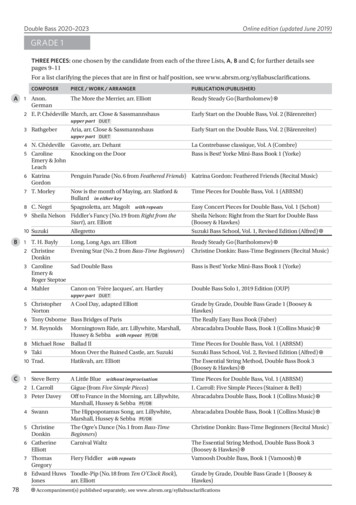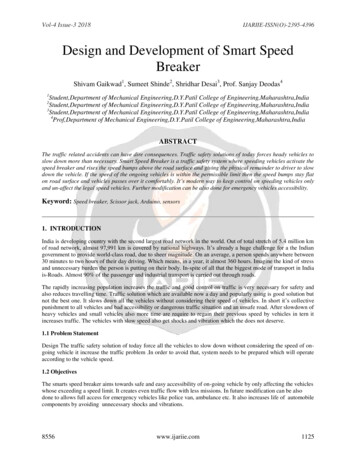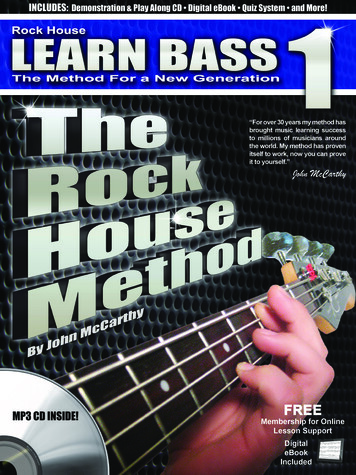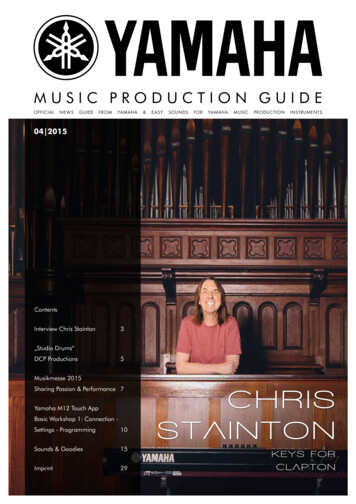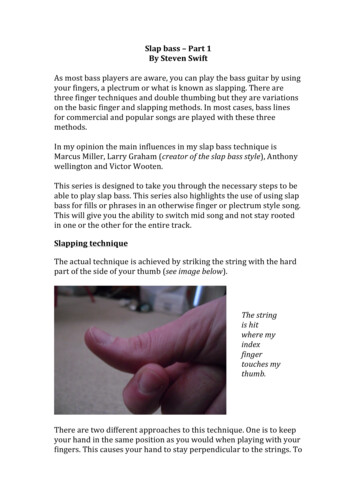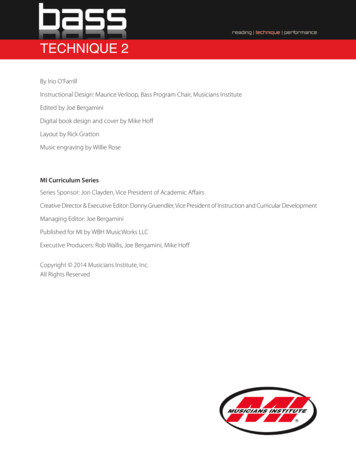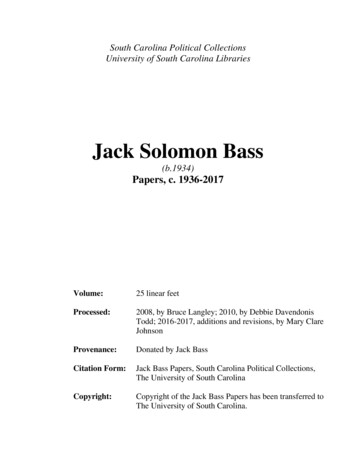
Transcription
South Carolina Political CollectionsUniversity of South Carolina LibrariesJack Solomon Bass(b.1934)Papers, c. 1936-2017Volume:25 linear feetProcessed:2008, by Bruce Langley; 2010, by Debbie DavendonisTodd; 2016-2017, additions and revisions, by Mary ClareJohnsonProvenance:Donated by Jack BassCitation Form:Jack Bass Papers, South Carolina Political Collections,The University of South CarolinaCopyright:Copyright of the Jack Bass Papers has been transferred toThe University of South Carolina.
South Carolina Political CollectionsJack Bass Papers, Page 2Biographical Note:Described as a “journalist, Southerner, teacher, scholar and damn good writer” by editorJames O’Shea Wade, Jack Bass has displayed many talents throughout his long, variedcareer.1 The author of many nonfiction books and articles for major publications like TheNew York Times and The Washington Post, he has received national recognition for hisstudy of and works on the American South. In addition to teaching courses at the Universityof South Carolina, South Carolina State University, University of Mississippi, College ofCharleston, and The Citadel, Bass is a noted oral historian, interviewing hundreds ofnotable people across the South, from South Carolina Governor Richard Riley to PresidentBill Clinton.Jack Solomon Bass was born in 1934 to Nathan and Esther Bass in North, South Carolina.One of seven children, he was educated in North’s public schools and played high schoolfootball. Yet he discovered journalism by means of baseball. As a teenager, his firstreporting assignment was to call in the scores of North’s semiprofessional baseball team toThe Times and Democrat of Orangeburg. He got the job because he knew how to score ballgames, earning 1.00 per game.Bass attended the University of South Carolina (USC), where his activities includededitorship of The Daily Gamecock and membership in the Phi Epsilon Fraternity and theBlue Key Honor Society. He graduated in 1956 with a degree in journalism. Aftergraduation, he joined the U.S. Navy and attended officer’s candidate school in Newport,Rhode Island. Bass was assigned to North Island Naval Station in Coronado, California,and later to the Philippines.After a three-year stint in theNavy, Bass and his familymoved to Charleston, SC,where he began hisprofessional career as ajournalist. He and his wife,Carolyn McClung, a felloweditor of The DailyGamecock, whom he marriedin 1957, had three children:Kenneth, David, andElizabeth. He worked for TheNews and Courier for a yearBass the Navy pilot (front row, 2nd from right)before forming a partnership withfriend and fellow journalist Dew James to open a weekly newspaper, The West AshleyJournal, in 1961. Many residents of West Ashley praised Bass and James for their work.1James O’Shea Wade, letter to Robert D. Loomis, 03/08/1996, Publications, Bass Papers
South Carolina Political CollectionsJack Bass Papers, Page 3However, Bass wrote to a friend in December 1962, “[I]f you know of someone withgood character and some knowhow who might be interested in purchasing a part-interestin a struggling suburban weekly with good potential for growth, I would be interested intalking to him.”2 Bass and James found a buyer, but The West Ashley Journal ran its laststory in 1964.That same year, Bass began working as the governmental affairs editor of The State andmoved to Columbia. This position put him in charge of many stories related to race andpolitics throughout the Southern states. In 1965, he was one of twelve American journalistsselected to receive the Nieman Fellowship, an award for mid-career journalists enablingthem to study at Harvard University for a year. The Basses moved to Cambridge,Massachusetts, and Bass took courses in history, government, and constitutional law.Bass served as the Columbia Bureau Chief for The Charlotte Observer, 1966 to 1973. Inaddition, in 1967, he became a part-time lecturer in journalism at USC. The following year,he was named the South Carolina Journalist of the Year.On February 8, 1968, tragedy struck the campus of South Carolina State College. Duringa protest triggered by the segregation policy at an Orangeburg bowling alley, studentsclashed with the National Guard, leaving three students dead and 27 injured. As he reportedon the events of the incident and its aftermath, Bass began to consider writing a book. JackNelson, who worked as the Atlanta Bureau Chieffor the Los Angeles Times and also covered thetragic affair, had similar ideas. This led to acollaboration between the two reporters.Their book, The Orangeburg Massacre, offered analmost minute-by-minute account of the shootings,as well as the investigation that followed. After itwas published in 1970, accolades streamed in fromformal reviewers and individual readers alike.Senator Ernest F. Hollings wrote to Bass inNovember 1970: “Look, I’ve just scanned thisbook, but it’s undoubtedly authoritative and soengaging in style you just can’t scan. For monthsnow I have answered on campuses that I don’tknow, that I wasn’t there and in a sense I hate tolearn. But unless we do, we’re all lost. Icongratulate both you and Jack Nelson for turningon the light.”3 John Bogert, a student injured during the incident, also wrote to Bass: “Ithought I would write you also and thank you for not letting my friend Sam Hammond diewithout ever being heard. It was such a very good work to see after so many years of crying23Jack Bass, letter to G.A. Buchanan, 12/31/1962, Journalism, Bass PapersErnest F. Hollings, letter to Jack Bass, 11/12/1970, Publications, Bass Papers
South Carolina Political CollectionsJack Bass Papers, Page 4in the wilderness. I just wanted you to know how much I appreciated it and how deeplyaffected I once again became. The only trouble is that now it all seems like yesterdayagain.”4Not all reviews of The Orangeburg Massacre were favorable, however. Most notably, FBIDirector J. Edgar Hoover was outraged at Bass and Nelson’s critique of the FBI’sinvestigation of the incident. Hoover wrote to Bass, “In summary, the book is so biased inits attempt to smear the FBI that it raises serious questions as to the competence andobjectivity of the authors.”5Bass did not wait long before beginning work on a new book. In 1972, he wrote PorgyComes Home: South Carolina after 300 Years. He documented the progress and pitfalls ofrace relations in the Palmetto State, drawing on his experiences as a native and a reporter.In 1973, Bass began work as a research scholar at Duke University’s Institute of PolicySciences and Public Affairs. During his timethere, he co-authored his third book, TheTransformation of Southern Politics, withWalter DeVries, a political scientist andcampaign consultant. The book was an updateon V. O. Key’s Southern Politics in State andNation, published in 1949. Bass and DeVriesspent two years traveling over 40,000 milesthroughout the eleven states of the formerConfederacy and conducting over 360interviews with such prominent figures asgovernors Jimmy Carter and John West. Basswrote their publisher at Basic Books in June1974, “There is no doubt the South haschanged. Picture a poolside cocktail party latelast Friday afternoon at the Holida[y] Inn atSantee, S.C. for a conference of SouthernBlack Mayors—with two white bartenders.”6Bass was the first writer-in-residence at South Carolina State College, 1975 to 1978, wherehe taught journalism and conducted research for a book, never completed, about blackpolitical leadership. He earned his master’s degree in journalism from USC in 1976.In a bold move in 1978, Bass took a break from both journalism and academia in an attemptto unseat four-term Republican congressman Floyd Spence. One of his supporters, FranMcCarthy, wrote, “Your campaign seems to be only a natural progression from thecompassion and concern that was always evident in your writing I was inspired by yourwork and it’s quite heartening to see someone testing heart-felt convictions in public life.”74John M. Bogert, letter to Jack Bass, 08/31/1972, Publications, Bass PapersJ. Edgar Hoover, letter to Jack Bass, 09/29/1970, Publications, Bass Papers6Jack Bass, letter to Paul Neuthaler, 06/06/1974, Publications, Bass Papers7Fran McCarthy, letter to Jack Bass, 10/25/1978, Campaign, Bass Papers5
South Carolina Political CollectionsJack Bass Papers, Page 5Bass won the Democratic primary, but lost the general election to Spence, receiving 43%of the vote.In 1979, Bass renewed his relationship with USC through an appointment as a researchfellow at the Institute of Legal History. During this time, he worked on his fourth book,Unlikely Heroes, which examined the role of the judges of the Fifth Circuit Court ofAppeals in effecting change in the South during the Civil Rights era. After the book waspublished in 1981, Bass agreed to partner with USC to direct “a five-year project fundedby the National Endowment for the Humanities and additional grants from Ford,Rockefeller, and Carnegie to produce a fourteen-hour television course” called “TheAmerican South Comes of Age.”8 The course explored the social, political, and economictransformation of the South since World War II. Bass traveled across the South, conductingvideotaped interviews with such people as Senator Strom Thurmond and Governor BillClinton. In addition, Bass served as editor for a PBS documentary, “A Different Dixie:Portraits of Change,” which was released in 1984.That same year, Bass and his wife Carolyn divorced and he married poet and author AliceCabaniss. He returned to teaching in 1987 as a journalism professor at the University ofMississippi, where he spent the next eleven years. In conjunction with teaching, he becamedirector of the William F. Winter Oral History Project to document Winter’s tenure asgovernor of Mississippi, 1980 to 1984. He also participated in a project to make adocumentary about George Wallace, the controversial, four-time governor of Alabama.Bass soon began researching his fifth book, abiography of Alabama Judge Frank M. Johnson,Jr. His interest in Johnson grew out of earlierinterviews with the judge for Unlikely Heroes.Jacqueline Kennedy Onassis served as his editorfor Taming the Storm: The Life and Times ofFrank M. Johnson, Jr. and the South’s FightOver Civil Rights, 1993. That same year, Bassserved as a consultant and expert witness forNAACP, Inc., et al. v. City of Columbia, et al., acase that sought to change election practices forCity Council.Following his divorce from Cabaniss in 1993,Jack married author, chef, and TV personalityNathalie Dupree in 1994. That same year,Taming the Storm won the Robert F. KennedyBook Award. He spent the next several years teaching, writing articles and reviews, andspeaking. In 1998, he began pursuing a doctorate in American studies at Emory University.He decided to write a biography of Strom Thurmond as his dissertation. He partnered withMarilyn W. Thompson, who had conducted several in-depth interviews with Thurmond8Bass, J. (2016). How Charles Joyner changed my life. In O. V. Burton and E. E. Prince, Jr. (Eds.),Becoming Southern Writers (pp. 26-37). Columbia, SC: University of South Carolina Press
South Carolina Political CollectionsJack Bass Papers, Page 6and key associates over the years. Bass left the University of Mississippi in 1999 to accepta position as a professor of humanities and social sciences at the College of Charleston.After Thurmond’s death in July 2003, Essie Mae Washington-Williams publicly confirmedthat she was the senator’s bi-racial, illegitimate daughter. Bass and Thompson decided towrite another book about Thurmond and analyze his life in light of Washington-Williams’sadmission. Strom: The Complicated Personal and Political Life of Strom Thurmond waspublished in 2005. In response to a critic who did not see much difference between the twobooks, Bass wrote, “The new book is far more than an update. From beginning to end, thenew book fully incorporates the history of their relationship, which spanned more than sixdecades. In the end neither the father nor daughter found the relationship emotionallysatisfying, but it provides an intriguing saga that fully fleshes out Thurmond’s life story.”9After retiring from the College of Charleston in 2008, Bass served as the director of TheCitadel World War II Alumni Oral History Project and for two years also taught as a facultymember of The Citadel’s Department of History. Along with co-author Scott Poole, hefinished work in 2009 on his eighth book, The Palmetto State: The Making of ModernSouth Carolina, which focused on the importance of race relations throughout the state’shistory. In 2011, he received the South Carolina Governor’s Award in the Humanities.Currently, Bass continues to lecture and write, most often op-ed pieces, and activelydevelop his earlier publications. He is working on a ninth book, Justice Abandoned, whichfocuses on “the Supreme Court’s central role in ending Reconstruction and underminingcongressional intent through its interpretation” of the 14th and 15th Amendments to theConstitution.10 He and his wife, Nathalie Dupree, live in Charleston.Scope and Content Note:The Jack Bass Papers, c. 1936 to 2017, consist of 25 linear feet of material chieflydocumenting Bass’s work in researching and writing his books. The collection is dividedinto nine series: Academic, Campaign, Journalism, Personal, Publications, Topical,Audiovisual, Clippings, and Vertical File Materials.Academic, 1967-2011, documents Bass’s positions as a professor or instructor at variousinstitutions. Material relates to job searches, classes taught, student work, andcorrespondence with other faculty members and students. The series also includesdocumentation of several projects undertaken by Bass, such as the American South Comesof Age Project and the William F. Winter Oral History Project. Of particular interest is atranscript of a 2005 roundtable discussion on Brown v. Board of Education, featuring Bassas one of the panelists.At the University of Mississippi, Bass chaired the Journalism Department Chair SearchCommittee, in addition to teaching. In 1993, Bass drafted faculty senate legislation calling9Jack Bass, letter to Sam Tanenhous, 06/16/2005, Publications, Bass PapersBass, J. (n.d.). Meet the author. Retrieved from http://www.jackbass.com/10
South Carolina Political CollectionsJack Bass Papers, Page 7for an end to the playing of “Dixie” at university events. Papers from the ensuingcontroversy include correspondence and the university senate act. While at South CarolinaState College, Bass worked on a book on black leadership. Although a book nevermaterialized, correspondence, proposals, and research materials related to the project areincluded.At the University of South Carolina, Bass developed a 14-part television course, “TheAmerican South Comes of Age” (ASCOA) and edited the accompanying study guide.Papers include grant applications, an instructor’s guide, and two versions of the studyguide. In the midst of development, Bass became involved in a lengthy dispute with theuniversity over contractual issues related to ASCOA and its marketing. In conjunctionwith the course, Bass also served as director of the documentary, “A Different Dixie:Portraits of Change.” Budgets, information on actors, and funding requests are included.Campaign, 1971-1988, chiefly documentsBass’s 1978 run for Congress. Topical filesrepresent Bass’s positions on key issuesfrom abortion to labor. In particular, Basschampioned environmental issues andreceived much correspondence related tonuclear waste and the Russell Dam. Afterhis defeat, condolence letters poured infrom citizen supporters and politicians,including Vice President Walter Mondaleand Senator Ernest F. Hollings. Other filesdocument Bass’s involvement with variousDemocratic gubernatorial, senatorial, andpresidential campaigns. For somecandidates, he authored speeches and pressreleases; for others, he simply offeredwords of encouragement.Journalism, 1959-2016, features articles authored by Bass, arranged chronologically andlisted in Appendix I. The majority of material comes from Bass’s work as a reporter andbureau chief for The Charlotte Observer and The State newspapers. Both the General fileand the files on various magazines, journals, and newspapers document article ideas,publication details, and the working relationship Bass had with colleagues. A number ofbook reviews written by Bass, 1976 to 2005, are listed in Appendix II. Material relating toBass’s publication of The West Ashley Journal details the challenges and rewards ofpublishing a newspaper.In 1998, Bass participated in a project initiated by the University of Maryland, titled “TheState of the American Newspaper.” Articles, circulation statistics, interview notes, andissues of the American Journalism Review document Bass’s extensive research for theproject. Several West Coast newspapers, used as research materials, were removed fromthe collection. They include Feb. 10, 1999, editions of The Argus, The Daily Review, The
South Carolina Political CollectionsJack Bass Papers, Page 8Oakland Tribune (Cityside and Eastbay Hills editions), San Mateo County Times (morning,noon, and evening editions), Alameda Times-Star, and Tri-Valley Herald (Livermore,Pleasanton, and Dublin; San Ramon, Danville, and Blackhawk; Tracy, Mantera, andLathrop editions).Personal, 1954-2012, includes information on Bass’s family, education, military service,and membership activities in various organizations. Bass also kept diaries in reporter’snotebooks intermittently from 1973 to 1991. Material documenting the 2010 senatorialcampaign of Bass’s wife, Nathalie Dupree, is present, as well as a book tracing the Bassfamily history. Over 25 speeches on such topics as the Orangeburg Massacre, Southernpolitics, and civil rights are listed in Appendix III.Publications, 1968-2015, comprise the largest series, arranged chronologically by title.Each major publication includes correspondence with literary agents, publishers, andreaders, as well as promotional and research materials. Drafts files consist of many rewritesand revisions made to works.Research materials for The Orangeburg Massacre include correspondence with GovernorRobert E. McNair, Cleveland Sellers, Jr., and South Carolina State College students JohnStroman and John Bogert. Bass and Nelson’s frustrations in getting the book published arealso documented. There are also materials on two proposed films and two radio programsbased on the book.There is a significant amount of research material for The Transformation of SouthernPolitics that reflects the travels of Bass and co-author Walter DeVries. Materials includenotes, correspondence with interviewees, and interview transcripts. The pair also gatheredstatistical data on political leanings throughout the South from a number of researchgroups. Materials from 1993 to 1994 reflect research undertaken for the 1995 reprint of thebook.Research materials for Unlikely Heroes mainly consist of interviews with judges John R.Brown, Elbert P. Tuttle, John Minor Wisdom, and Frank M. Johnson, Jr. Basssupplemented this research with correspondence and interviews with clerks, politicians,and others with strong connections to the judges. Interestingly, one of the longer transcriptscomes from Bass’s interview with the daughter of Judge John M. Wisdom, Katherine. Twofolders of correspondence between Bass and Judge Wisdom reveal a relationship thattranscended the interview process. Also present is a screenplay, “Solomon’s Heart,” basedon the book.Jacqueline Kennedy Onassis served as Doubleday’s editor for Taming the Storm. Hercorrespondence with Bass reveals their professional working relationship. Material relatedto the Robert F. Kennedy Book Award is also present. Research at the John F. KennedyLibrary and subsequent interviews with Georgia Governor Ernest Vandiver led to Bass’sdiscovery that it was not a call from Robert F. Kennedy to a judge in Georgia that gotMartin Luther King, Jr. out of prison, but actually a call from John F. Kennedy to Vandiver.
South Carolina Political CollectionsJack Bass Papers, Page 9The Robert Kennedy story was a cover to protect the political interest of both the governorand then-presidential candidate Kennedy.Materials for Ol’ Strom: An Unauthorized Biography of Strom Thurmond include Bass’soriginal 1979 book proposal and two versions of book proofs. Research materials includeinterview transcripts with Thurmond friends, staff, and family members. Documentsrelated to daughter Essie Mae WashingtonWilliams include copies of her correspondencewith then-Governor Thurmond, 1947-1950, andinformation related to her studies at SouthCarolina State College.Much of the research for Strom: The ComplicatedPersonal and Political Life of Strom Thurmondfocuses on Essie Mae Washington-Williams.Correspondence between Bass, Thompson, andpublisher Public Affairs highlight their concernwith the editing process. Also present is ascreenplay adapted from the book and written byGodfrey Cheshire.Research for Justice Abandoned includes manySupreme Court decisions and legal briefs for casesthat spanned the late 19th and 20th centuries.Topical, c. 1960-2005, documents Bass’s interest in such subjects as the Confederate flagand the 1970 murder of Wallace Youmans. The file on the 1986 Tax Reform Act consistsof correspondence with several congressmen, such as Ernest F. Hollings and StromThurmond. The Persons files contain either correspondence with or information about suchpeople as Bill Clinton, Ernest F. Hollings, and Richard Riley. The Practice of Oral Historyfile contains a list of questions for interviewing federal judges. Additionally, Bass wasinterested in the nomination of Ed Carnes, a possible successor to Judge Frank M. Johnsonon the Eleventh Circuit Court of Appeals. Materials highlight the support for and againstthe Carnes nomination. Documents from a 1983 reapportionment case, South Carolina v.United States/NAACP, include injunction materials, depositions, and reference materials.Materials related to the voting rights case, NAACP, Inc., et al. v. City of Columbia, SC, etal., for which Bass served as a consultant and expert witness, are also present.Audiovisual, c. 1936-c. 2005, includes photographs, negatives, audiocassettes, andvideocassettes. Photographs include a 1940 school portrait of “Jackie Bass,” Bass’s highschool football portrait, and a picture of Bass and Nathalie Dupree greeting President BillClinton at the White House. Several photographs from Bass’s military service are alsoincluded. Audiocassettes document interviews mainly conducted for his books. Avideocassette shows Bass’s appearance on the “Today Show” in September 1976. VHStapes include interviews with William F. Winter.
South Carolina Political CollectionsJack Bass Papers, Page 10Clippings, 1953-2016, are topically arranged. Many feature stories written by Bass andreflect his study of Southern politics and civil rights. Also, the Publications files containresearch materials and reviews for several Bass works.Vertical File Materials, 1993-2017, contain information gathered by SCPC relating toBass and may duplicate information already present in the collection.Series sTopicalAudiovisualClippingsVertical File MaterialsBoxes 1-3Boxes 3-4Boxes 4-6Boxes 6-9Boxes 9-18Boxes 19-20Boxes 21-23Boxes 24-26Box 26Box List:Academic:GeneralCitadel, The:Course Proposal, “The Judiciary and the Press during the Civil Rights Era”Employment ApplicationWorld War II Oral History ProjectCollege of Charleston, The:GeneralCourses:Guest LecturersIn-Depth Reporting (2)Overseas ReportingSouthern Jewish Experience (2)EmploymentProjects:GeneralBlack Diaspora Project:GeneralReport, “From Runaways to Migrants”ResearchCamp Meeting (research materials on Methodist camp meetings)New South Comes of Age, TheStudents:Evaluations (2)RecommendationsReviews, The Orangeburg MassacreBox 1
South Carolina Political CollectionsJack Bass Papers, Page 11Columbia CollegeEmployment Applications:GeneralDuke UniversityGeorge Washington UniversityStanford UniversityUniversity of MarylandSouth Carolina State College:GeneralBlack Leadership Project: [see also: Publications, Book Proposals]GeneralReport, Attitudes and Perceptions of Black Elected Officials in the SouthResearch MaterialsEmploymentStudentsUniversity of Mississippi (Ole Miss):General:1983-19911992-1999, n.d.Courses:General (3)Evaluations (2)Guest Lecturers (2)“Dixie” and Confederate Flag:General[Political Cartoon, see: tReviewsSalary and Leave RecordsTenureFaculty MeetingsGrant Proposals:GeneralCarnegie Corporation of New YorkFord FoundationJames L. Knight FoundationNational Endowment for the Humanities (NEH)Journalism Department Chair Search Committee:AnnouncementCandidatesMeetingsReference MaterialsStudents:General (2)RecommendationsThank You LettersWallace, George, Film Documentary Project:GeneralScriptWinter, William F., Oral History Project:GeneralBox 2
South Carolina Political CollectionsJack Bass Papers, Page 12Book ProjectFunding:GeneralMississippi Humanities CouncilInterviews:GeneralTranscripts:Clark, RobertCole, William J.Mandell, HowardMinor, BillMolpus, DickMullins, Andrew P., Jr.Winter, EliseWinter, William F.:General (2)Tape Transcripts: [see also: Audiovisual, VHS, “Governor William F. WinterInterview”]Tape 1Tape 2Tape 3Tape 4Tape 5Tape 9Tape 11Tape 12Research, Building Consensus: A History of the Passage of the Mississippi EducationReform Act of 1982 by Andrew P. Mullins, Jr.University of South Carolina (USC):GeneralAmerican South Comes of Age (ASCOA) Project:GeneralAlfred Knopf Publishing Inc.Contracts (2)Course:GeneralChapter Drafts (course readings):Chapters 1-4Chapters 5-6Chapters 7-9Chapters 10-14Evaluations (2)Instructor’s GuidePublicityResearch:GeneralBrown, John R.Johnson, Frank M., Jr.Tuttle, Elbert P.Study GuideGrant Proposals:GeneralAnnenberg/Corporation for Public Broadcasting, 1984National Endowment for the Humanities (NEH):Box 3
South Carolina Political CollectionsJack Bass Papers, Page 131980 (2)1981 (3)TV Documentary, “A Different Dixie: Portraits of Change,” 1984:GeneralActorsExpensesFilm Archive ProposalFunding ProposalEmploymentJournalism 1974, Gubernatorial:Dorn, William Jennings BryanZeigler, Eugene N.1976, Church, Frank, Presidential1978, Riley, Richard, Gubernatorial1978, Bass, Jack, Congressional:GeneralCampaign Diary [see also: Personal, Diaries][Campaign Sign, see: Oversize]FundraisingLetters of SupportOppositionPress Releases and Campaign LiteratureResearch (2)ScheduleSpeechesTopical:AbortionBrown Lung DiseaseEducationEnergy, Natural GasEnvironmental Issues:GeneralNuclear WasteRussell DamFarmersForeign PolicyForeign TravelFriends of Free ChinaLaborSenior CitizensWomen’s Rights1984, Hollings, Ernest F., Presidential1988, Simon, Paul, PresidentialJournalism:GeneralArticles: [See Appendix I for item list of Articles]General:1959-1967Box 4
South Carolina Political CollectionsJack Bass Papers, Page 41995-19971998-19992000-20022003-20092012-2016n.d. (3)Biographical:GeneralBrown, John R.Dabbs, James M.Johnson, Frank M., Jr. (2)Thurmond, StromTuttle, Elbert P.Winter, William F.Wisdom, John M.“History Looks at George Wallace”:Distribution Survey:“No” Responses“Yes” ResponsesDraftsProposalsAwardsBook Reviews, 1971-2005 (2) [See Appendix II for list of Book Reviews]Employment Applications:GeneralNieman Foundation for Journalism:GeneralLetters of SupportFord Foundation Report on Ethnic Studies:General, Oct. 1976-Dec. 1978DraftsExpensesFreedom of Information:GeneralTwentieth Century Fund Task Force on the Government and the PressLetters to the EditorMagazines/Journals:GeneralFoundation NewsNew Republic, TheNew Yorker, ThePhiladelphia Inquirer, TheSouthern MagazineNewspapers:GeneralAtlanta Journal and ConstitutionCharlotte Observer, The:General:Box 5
South Carolina Political CollectionsJack Bass Papers, Page 151966-19681969-1973, n.d.Orangeburg MassacreColumbia Record, TheNational Observer, TheNew York Times, TheState, The:GeneralPromotionWashington Post, TheWest Ashley Journal, The:GeneralAdvertising and CostsLetters to the EditorSale of NewspaperProject on the State of the American Newspaper:GeneralDraftsResearch:General (2)Circulation StatisticsCourt Cases (Newspaper Monopolies)Cox NetworkInterview NotesMedia News Group, Inc. Editor’s Conference ProgramNewsletter, “Newspaper Acquisitions”Series, American Journalism Review Magazine:1998, May-Dec.1999:Jan.-MayJuly/Aug., “Newspaper Monopoly” (by Jack Bass)Proposal, Southern Investigative Journalism ProjectReadersResearch, West, John C.Sigma Delta Chi Professional Journalistic 1990199119921993 (2)19941995-19961997Box 6Box 7
South Carolina Political CollectionsJack Bass Papers, Page 1619981999-20012002-20042005-2013n.d. (2)Appointment Book, 1997AwardsBass, Jack S. and Nathalie, Husband and Wife v. B. J. Crawford, Individually, and B. J. Crawford,LLCBiographical Material [see also: Clippings, Biography]CorrespondenceGeneralHoliday GreetingsDiaries:1973, Sept.-Apr. 19741974, Apr. (cont.)-Oct.1974, Nov.-July 19751975, July (cont.)-May 19771977, May (cont.)-Mar. 19781979, Mar.-Dec.1980, Oct.-June 19841985, June-Nov.1987, Dec.-Nov. 19881991, JuneDonated Materials, Jimmy Carter Presidential Library and ory University, Institute of Liberal Arts:AdmissionsCommencement Program, 1999Coursework:GeneralEssays (2)Dissertation:Prospectus DraftsReviewsDoctoral ExaminationFellowships:ApplicationsNieman ework, EssayDiary, 1966 [see also: Personal, Diaries]ReportsHa
thought I would write you also and thank you for not letting my friend Sam Hammond die without ever being heard. It was such a very good work to see after so many years of crying 2 Jack Bass, letter to G.A. Buchanan, 12/31/1962, Journalism, Bass Papers 3 Ernest F. Hollings, letter to Jack Bass, 11/12/1970, Publications, Bass Papers

